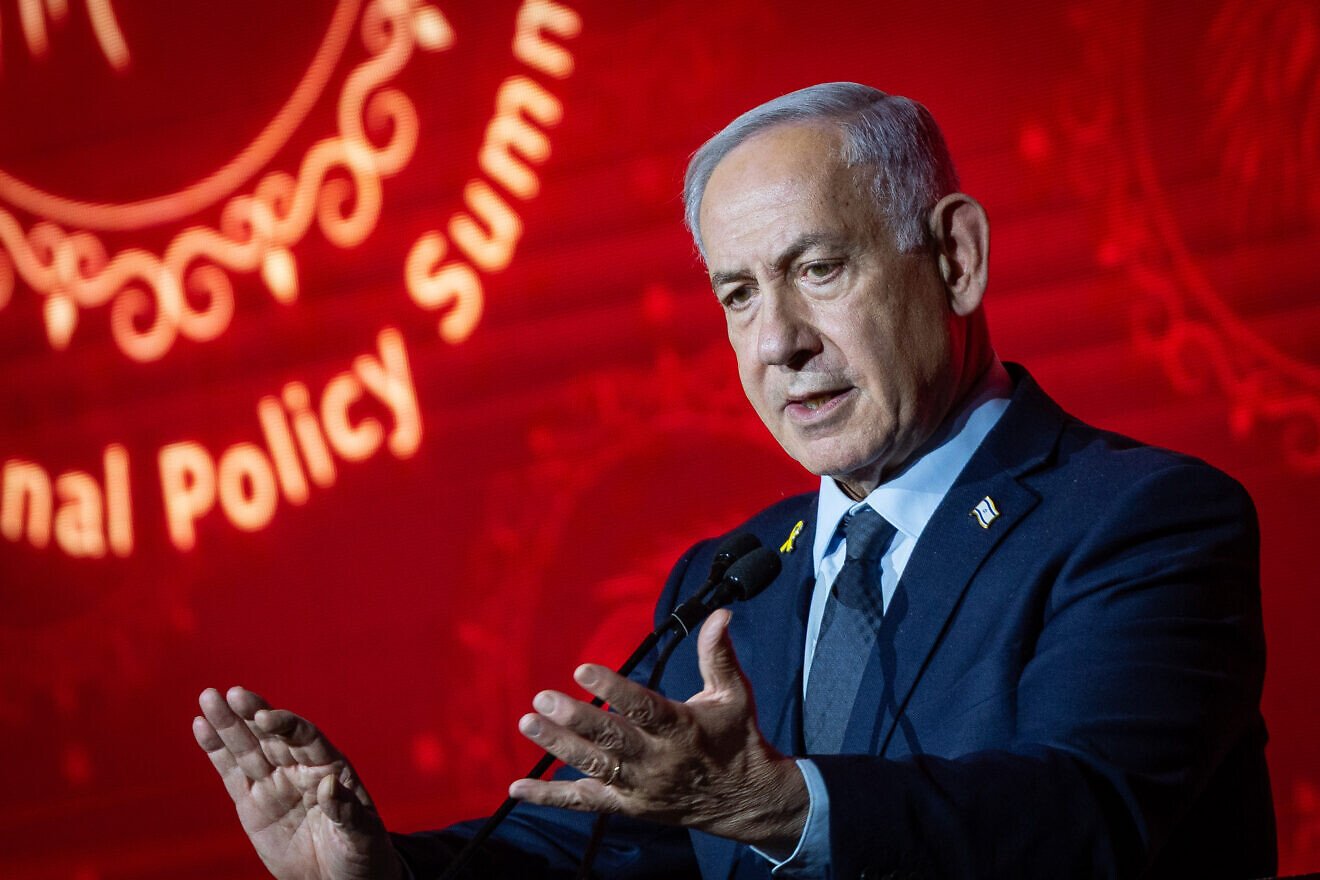 Netanyahu’s finest hour: Facing Iran alone, if he must
Netanyahu’s finest hour: Facing Iran alone, if he must
Fiamma Nirenstein
This the final phase of the Zionist mission: to secure a state where Jews can live without the constant threat of annihilation.
 Israeli Prime Minister Benjamin Netanyahu speaks at the JNS International Policy Conference in Jerusalem, April 27, 2025. Photo by Yonatan Sindel/Flash90.
Israeli Prime Minister Benjamin Netanyahu speaks at the JNS International Policy Conference in Jerusalem, April 27, 2025. Photo by Yonatan Sindel/Flash90.
From the moment he returned to power in December 2022, Israeli Prime Minister Benjamin Netanyahu made it clear: Iran comes first.
In truth, Iran has always been at the core of Netanyahu’s worldview from his earliest education under his father, historian Benzion Netanyahu, who instilled in him a historic understanding that for the Jewish people, freedom has always meant defending against existential threats.
Now, in the aftermath of Oct. 7, 2023, that mission is no longer theoretical. It’s urgent. And it’s no longer just Netanyahu’s. It’s the mission of the entire Israeli people.
This is the moment to complete the very foundation of the State of Israel—not only as a military power, but as a sovereign nation that determines when and how to confront those who seek its destruction. And no threat looms larger than the regime in Tehran, which has openly waged war against Israel and the West since 1979.
Netanyahu is the only world leader to have addressed the U.S. Congress four times, most recently on July 24, 2024, following the horrors of Oct. 7. He did not ask for pity or resources. He brought resolve—and with him, the wounded and the waiting: IDF veterans ready to return to combat and the families of the hostages still trapped in Gaza.
In that address, Netanyahu renewed the warning that cost him his relationship with Barack Obama and strained his ties with Joe Biden: Any deal with the ayatollahs is a death sentence for Israel.
His position is now vindicated. Intelligence documents smuggled out of Iran proved beyond doubt that the Islamic Republic had been lying to the world about its nuclear ambitions. Its nuclear bomb was nearly operational, accompanied by a massive arsenal of ballistic missiles.
Israel could wait no longer.
Netanyahu, battered by political scandals and protests, hospital visits and unrelenting calls for his resignation, emerged from the chaos of events related to Oct. 7 changed but focused. He understood that the window to act was closing. And as he told then-U.S. Secretary of State Antony Blinken: “If you stop sending us ammunition, we’ll fight with our fingernails.”
That wasn’t bluster. It was policy.
In these past months, Netanyahu has returned to the essence of who he is: a prime minister who sees evil clearly and is willing to confront it—alone if he must. From Gaza to Tehran, from the press rooms to the battlefield, he has appeared with soldiers, toured bombed homes and spoken with quiet clarity.
The accusations against him—champagne, cigars, courtroom theatrics—have faded in the face of reality. The right-wing coalition that he leads has not delivered on the doomsday predictions of “messianism” or annexationism. Itamar Ben-Gvir may talk, but Netanyahu governs, and he does so with restraint.
The blood libels hurled by the international community—genocide, ethnic cleansing—have no basis in reality. Israel has waged this war with a level of concern for civilian life that no other democracy under siege would dare attempt. Hamas deliberately sacrificed its own people, embedded terror bases under homes and schools, and refused every opportunity to return the hostages, knowing full well it would have ended the war.
From the outset, Netanyahu identified Iran’s axis of terror—Hamas, Hezbollah and the Houthis—and moved to dismantle it. He approved some of the most daring operations in Israeli history: the Sept. 17 walkie-talkie and pager-triggered strike against Hezbollah operatives, and 10 days later, the Sept. 27 elimination of Hezbollah leader Hassan Nasrallah.
Israeli soldiers, despite international pressure and painful losses, blocked Hamas and decimated Hezbollah’s infrastructure. Netanyahu refused to allow Gaza to fall back into the hands of the Oct. 7 butchers. He extended that doctrine to Syria, newly freed from Assad’s grip, and even to the Houthi front.
This isn’t hubris. It’s strategic clarity.
This is the final phase of the Zionist mission: to secure a state where Jews can live without the constant threat of annihilation. As Netanyahu has said, once the Arab world stopped trying to drive Israel into the sea—especially through the Abraham Accords—Iran filled the vacuum. But where others equivocated, Netanyahu acted.
And now, Israel sees it. Some two-thirds of the public support his wartime leadership. The mask of Iran’s terror empire—woven through decades of Hamas attacks, Hezbollah bombings and global jihad—is finally being pulled off.
The message is clear: Israel’s story isn’t finished until its survival is no longer conditional. And that means facing down the architects of genocide, no matter how powerful or protected they may seem.
It’s a difficult path. But only a leader like Netanyahu could walk it—alone, if necessary—when so many others still pretend that the threat from Iran isn’t real.
 Dr. Fiamma Nirenstein is an Italian-Israeli journalist, author, and senior research fellow at the Jerusalem Center for Public Affairs. An adviser on antisemitism to Israel’s foreign minister, she previously served in the Italian Parliament (2008–2013) as Vice President of the Foreign Affairs Committee. A founding member of the Friends of Israel Initiative, she has written 13 books, including Israel Is Us (2009), and is a leading voice on Israeli affairs, Middle Eastern politics, and the fight against antisemitism.
Dr. Fiamma Nirenstein is an Italian-Israeli journalist, author, and senior research fellow at the Jerusalem Center for Public Affairs. An adviser on antisemitism to Israel’s foreign minister, she previously served in the Italian Parliament (2008–2013) as Vice President of the Foreign Affairs Committee. A founding member of the Friends of Israel Initiative, she has written 13 books, including Israel Is Us (2009), and is a leading voice on Israeli affairs, Middle Eastern politics, and the fight against antisemitism.
Zawartość publikowanych artykułów i materiałów nie reprezentuje poglądów ani opinii Reunion’68,
ani też webmastera Blogu Reunion’68, chyba ze jest to wyraźnie zaznaczone.
Twoje uwagi, linki, własne artykuły lub wiadomości prześlij na adres:
webmaster@reunion68.com
